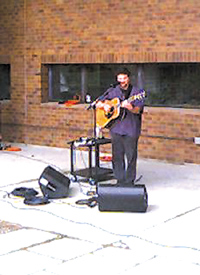Love, Life, Lust and Liberation: The Vagina Monologues
February 14, 2002
V-Day. June 6, 1944, the day American troops stormed the beaches of Normandy in order to take back control of Europe, right? Nice shot if you can even remember the exact date but, unfortunately, no cigar.
V-Day, unlike D-Day, involved non-militant, feminist writer Eve Ensler’s Vagina Monologues taking over McCormack Theatre, from Friday to Saturday night. Using their veritable arsenal of acting, skill, and wit, the cast seduced the audience with a myriad of monologues ranging from heart wrenching to humorous, poignant to painful.
The show opened with an introduction by Amber Fox (assistant director), Helena Prezio (artistic director, Lighting Designer), and Stephanie Romano (producer, director), discussing the purpose behind the use of the forbidden word “vagina”.
Unlike the radical feminism displayed and the negative hype from the media, this is a different, refreshing take on a continually blossoming movement, devoted to taking women back to the primal root of themselves, starting with the vagina, an oft-maligned, over looked, and under-appreciated body part.
From “cunt” to “cootchie-snorcher,” the vagina becomes an anthropomorphic expression of female identity throughout Ensler’s production. Based on a series of interviews with women, The Vagina Monologues started as a collection of essays contained within a book, and exploded into a phenomenon that has since translated itself to the stage.
V-Day itself is, in the words of the Monologues program, “a global movement to stop violence against women and girls…that promotes creative events to increase awareness, raise money, and revitalize the spirit of existing anti-violence organization.” In performing this non-profit production, the show collaborates with Planned Parenthood and benefits Rosie’s Place, a haven for poor and homeless women.
The Vagina Monologues starts with an introduction and segues into “Hair,” one woman’s discussion of hair (Joanna Marinova) and how a therapist encourages her to allow her husband to shave the most intimate area of her body in order to help stop his unfaithful ways. He never stopped cheating and cut her, causing her to bleed.
Throughout the evening, one is treated and trained to view the vagina as the embodiment of the female spirit. To revere it as sacred, familiarize, and embrace it, these are the principles involved in reclaiming a woman’s identity. The Vagina Monologues push women to explore their sexuality, the mystery of birth, and the beginning of life seated within their physical center. In the words of one of the cast, “It [Monologues] makes feminism accessible and understandable to the public.”
Each monologue manages to convey a different and unique aspect of “the feminine mystique.” In “The Woman Who Loved to Make Vaginas Happy,” Kristin Steeger makes the monologue most memorable with her amusing mimicry of female expressions of pleasure. On opening night, she violently rode a chair and fell backward with a grunt in reaching orgasmic nirvana, as “Courtney Love.” Although it was unintentional and somehow appropriate to the celebrity in question, Steeger rolled along seamlessly and continued to entertain and enlighten.
Particularly haunting was a performance given by Jen Keneally and Heather Phillips in “My Vagina Was My Village”, based on the experience of a rape victim during the Bosnian-Serbian struggle. The monologue was a simultaneous discussion of the heaven and hell of one woman’s vagina. While one actress narrated and pondered the symbolism of life and love that her vagina embodied, another actress spoke of the horror of violation and brutality of soldiers. What made this so disturbingly powerful was the way it was conducted; one actress was fully lit, and a few feet away, her doppelganger was draped in darkness.
The chemistry between cast members was especially visible in the ensemble pieces. To display such a formidable and cohesive bond between each member after only three weeks is nothing short of a miracle. The cast was driven by an indomitable energy, and large amounts of sugar derived from cookies imparted as gifts to members not fortunate enough to receive a little pre-rehearsal lovin’. However, as there were so many sweets to go around, there didn’t seem to be a problem for anyone.
The enthusiasm expressed by the players helped audience involvement. Various viewers were invited to answer questions such as “What would your vagina wear?” and entreated to liberate themselves by shouting “cunt,” much to the embarrassment of one parent. One audience member, Eric Whitner, said that, “It’s nice seeing another side of women’s solidarity. It’s a good experience to see what it’s like to have a vagina.”
Whether it’s menstruation or masturbation, no subject is too taboo or forbidden. The Vagina Monologues opens up a dialogue between women and the world.
To get more information about V-Day, visit www.vday.org.





















































